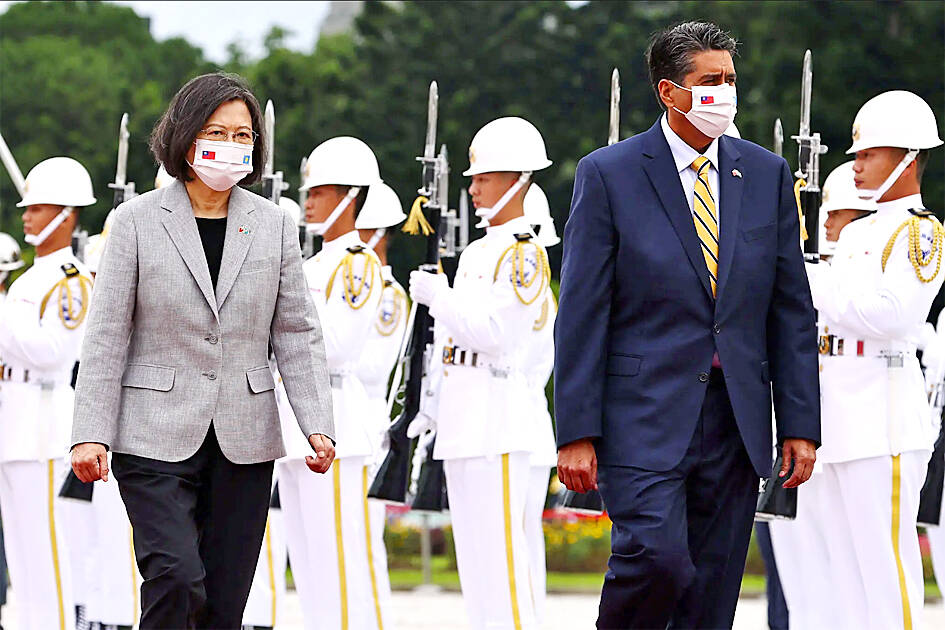Taiwan’s government has condemned a recent cyberattack targeting Palau and said it has been working closely with the Pacific island nation to beef up its cybersecurity to counter “authoritarian infiltration.”
Palau, a clump of about 350 small islands in the Pacific Ocean, has become increasingly important to the United States as China tries to build clout in the Indo-Pacific. This year, Washington finalized a long-delayed plan to give Palau hundreds of millions of dollars in aid over two decades.
According to a New York Times report published on June 2, Palau’s officials accused China of orchestrating the hacks in March during which over 20,000 confidential documents were stolen.

Photo: Reuters
The stolen documents, which later appeared on the dark web in April, reportedly contained confidential files on U.S. radar installations on Palau and crew lists of Japanese Navy ships that had visited Palau, the New York Times report said.
They also contained “hundreds of documents detailing the close relationship between Palau and Taiwan,” the report said.
Palau is one of only 12 countries worldwide that recognize Taiwan, officially named the Republic of China (ROC).
Officials in Palau told the newspaper that the attack was “politically driven” and that China was involved because it officially recognizes Taipei instead of Beijing.
“Everything points in that direction,” Palau President Surangel Whipps Jr. was quoted as saying in an interview. “It is unfortunate that China would do things like this,” he said, adding that Palau’s relationship with Taiwan remained “stronger than ever.”
In a statement, China’s Foreign Ministry told the New York Times that “it is extremely irresponsible for Palau to jump to conclusions and make unfounded accusations and smears against China without valid evidence.”
In Taipei , while asked about the report, MOFA issued a statement and said the ministry was aware of the March cyberattack targeting Palau and had a clear grasp of the so-called stolen documents.
Without directly naming the People’s Republic Of China (PRC), MOFA iterated Taiwan condemns “bad-intentioned people” and hacker groups for sabotaging global internet security.
Taiwan, which has also been a target of frequent cyberattacks as it battles “authoritarian expansion,” understands what Palau has been going through, MOFA said.
Taiwan is helping Palau strengthen its cybersecurity and digital resilience via a Taiwan Digital Opportunity Center in Palau and other cooperation projects to combat “authoritarian infiltration” and safeguard the rules-based international order, the ministry also said.

Taiwan has received more than US$70 million in royalties as of the end of last year from developing the F-16V jet as countries worldwide purchase or upgrade to this popular model, government and military officials said on Saturday. Taiwan funded the development of the F-16V jet and ended up the sole investor as other countries withdrew from the program. Now the F-16V is increasingly popular and countries must pay Taiwan a percentage in royalties when they purchase new F-16V aircraft or upgrade older F-16 models. The next five years are expected to be the peak for these royalties, with Taiwan potentially earning

STAY IN YOUR LANE: As the US and Israel attack Iran, the ministry has warned China not to overstep by including Taiwanese citizens in its evacuation orders The Ministry of Foreign Affairs (MOFA) yesterday rebuked a statement by China’s embassy in Israel that it would evacuate Taiwanese holders of Chinese travel documents from Israel amid the latter’s escalating conflict with Iran. Tensions have risen across the Middle East in the wake of US and Israeli airstrikes on Iran beginning Saturday. China subsequently issued an evacuation notice for its citizens. In a news release, the Chinese embassy in Israel said holders of “Taiwan compatriot permits (台胞證)” issued to Taiwanese nationals by Chinese authorities for travel to China — could register for evacuation to Egypt. In Taipei, the ministry yesterday said Taiwan

Taiwan is awaiting official notification from the US regarding the status of the Agreement on Reciprocal Trade (ART) after the US Supreme Court ruled US President Donald Trump's global tariffs unconstitutional. Speaking to reporters before a legislative hearing today, Premier Cho Jung-tai (卓榮泰) said that Taiwan's negotiation team remains focused on ensuring that the bilateral trade deal remains intact despite the legal challenge to Trump's tariff policy. "The US has pledged to notify its trade partners once the subsequent administrative and legal processes are finalized, and that certainly includes Taiwan," Cho said when asked about opposition parties’ doubts that the ART was

If China chose to invade Taiwan tomorrow, it would only have to sever three undersea fiber-optic cable clusters to cause a data blackout, Jason Hsu (許毓仁), a senior fellow at the Hudson Institute and former Chinese Nationalist Party (KMT) legislator, told a US security panel yesterday. In a Taiwan contingency, cable disruption would be one of the earliest preinvasion actions and the signal that escalation had begun, he said, adding that Taiwan’s current cable repair capabilities are insufficient. The US-China Economic and Security Review Commission (USCC) yesterday held a hearing on US-China Competition Under the Sea, with Hsu speaking on